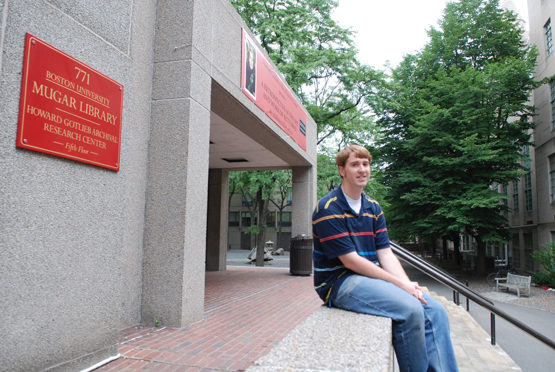Facing History, Letter by Letter
CAS senior delves into the Civil Rights Movement via the papers of famed lawyer Conrad Lynn

Joseph Clark is not spending his summer researching the American Civil Rights Movement in Mugar Memorial Library because his grandfather was one of the Sons of the Confederacy — not entirely. But the senior from Memphis, Tenn., has a complicated relationship with history: he understands why some people would rather not explore the past, yet he considers it an integral part of who we are.
“To become your own person, it’s necessary to know where you came from,” he says. “You build on what other people have left. You can’t really start from zero.”
Clark (CAS’10) studies 15th-century Atlantic history during the school year, focusing on the slave trade. This summer, with the help of a grant from BU’s Undergraduate Research Opportunities Program (UROP), created in 1997 to foster faculty-mentored undergraduate research and help students apply for funding and prepare research proposals, he’s delving into the more recent past. He’s using the personal archive of Conrad Lynn, a civil rights lawyer known both for his controversial cases — he defended freedom riders and draft resisters — and as the first black graduate of Syracuse University Law School. Lynn, who died in 1995, donated his papers to Boston University’s Howard Gotlieb Archival Research Center, which contains the papers of hundreds of well-known and lesser-known figures from a variety of fields. Clark is now working his way through 40 boxes of correspondence and personal mementos stored on Mugar’s fifth floor.
“He was a lawyer, so he was very meticulous and precise, and incredibly well documented,” Clark says. “Everything is detailed and typewritten, sometimes in triplicate.”
The project is meaningful for Clark on a personal and an academic level. Growing up in Memphis, where the Civil Rights Movement “left a pretty big footprint,” he says, piqued his interest in history, and his family’s rumored associations with the Sons of the Confederacy and the Ku Klux Klan make this exploration “sort of a cleansing.” As he’s delved deeper into Lynn’s life, he’s also uncovering the connections and offshoots that make academic research fascinating.
Lynn, for example, is known for representing two young boys, ages seven and nine, in what came to be known as the “Kissing Case.” The boys, who were black, were arrested and charged with rape in 1958 when they kissed a young white girl during play. One of Lynn’s principal correspondents during the case was Robert F. Williams, a local NAACP leader and later advocate of armed resistance in the struggle for racial equality; their correspondence, Clark says, paints a fascinating picture of the cultural climate in the civil rights and Vietnam eras.
“In the early years, Lynn’s tone was more tempered. As you get later and later, it becomes a fever pitch,” he says. “Around 1968, everything changes. There’s a sense of urgency around everything he writes. They’re asking, is there going to be a presidential election this year? What’s going to happen with the war demonstrations?”
In a letter to actor and activist Ossie Davis, dated April 29, 1968, Lynn pleaded for collaboration among black and white student activists:
“Last Wednesday I attended the dinner at the Hotel Roosevelt for Ella Baker. Stokely [Carmichael, a leader of the Student Nonviolent Coordinating Committee] and Rap Brown [former justice minister of the Black Panther Party] were there. I talked to them briefly. They are sobering up. We must keep the pressure on. On Sat. morning I talked with the black youth occupying Hamilton Hall at Columbia. They are desperate and they made me depressed.
“Now is the time for you and me and other black militants to press on all our activists the necessity for parallel or joint action with white radicals in specific circumstance. For example, it would be suicide for the black kids at Columbia to cut themselves off from SDS [Students for a Democratic Society]. There are signs that they are beginning to listen to reason this morning.
“Last week I wrote LeRoi Jones asking him not to testify before the Grand Jury against SDS or any individual white radicals. That would be playing into the hands of the fascist forces. Please get back to New York as soon as possible. Everything will be won or lost in 1968.”
Working with Lynn’s original documents has offered Clark a new understanding of his chosen field. He has the opportunity to decide for himself what’s significant, instead of relying on what other historians have selected for anthologies and books. He’s considering expanding his research to the New York Public Library — as well as to Roxbury, Mass., where he believes Lynn’s grandson works as a community organizer.
“You learn a lot from history, and it’s not just history that you’re learning,” he says. “Once you’re interested in one part, it leads you to the next.”
Jessica Ullian can be reached at jullian@bu.edu.
Comments & Discussion
Boston University moderates comments to facilitate an informed, substantive, civil conversation. Abusive, profane, self-promotional, misleading, incoherent or off-topic comments will be rejected. Moderators are staffed during regular business hours (EST) and can only accept comments written in English. Statistics or facts must include a citation or a link to the citation.